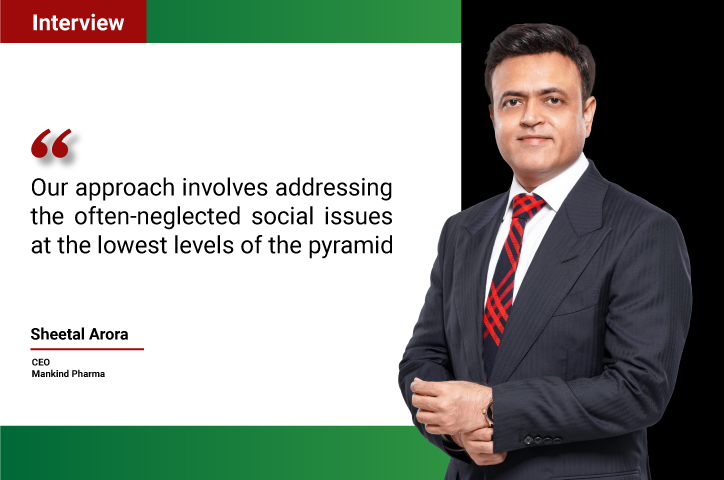With its CSR activities primarily focused on initiatives relating to health, education, and livelihood enhancement, Mankind Pharma Ltd. supports non-profit organizations engaged in healthcare facilities, social welfare, education, conservation of natural resources, and rural development.
TheCSRUniverse had an exclusive interview with Sheetal Arora, CEO, wherein he discussed the company’s significant collaboration with the Lepra Society, its goals, and the outcomes it aims to achieve through this partnership. He also shed light on their plans for expanding this initiative to other geographies and health issues.
Mr. Arora also touches upon the organisation’s plans to initiate new programs and forge partnerships with various organizations to expand their reach and impact in addressing societal challenges. Its proactive approach aims to bring about positive change and make a lasting difference in the lives of individuals and communities.
Scroll down to read the full interview:
Q. Please provide an overview of your partnership with the Lepra Society. What are the long-term goals and outcomes that you aim to achieve through this?Collaboration and how it aligns with the organization’s social vision.
A. The primary goal of our partnership with the Lepra Society is to enhance social dignity and provide comprehensive treatment to individuals affected by leprosy and elephantiasis.
Within this collaboration, we operate five CDCC (Community Development and Care Centers) across different states. These centers address various neglected issues, including:
- Treatment for leprosy and filariasis.
- Screening and contact tracing.
- Provision of shoes and other essential support to patients.
- Referral and treatment for critical patients.
- Implementation of awareness programs.
Our commitment to better healthcare aligns with the organization's broader social vision of addressing critical societal issues and promoting health and disease awareness.
Q. How many care centers have been established by Mankind Pharma across different locations to support this initiative? Does the company have any future plans to expand this initiative to other geographies or health issues?
A. Mankind Pharma has successfully established five CDCCs across diverse states, including Andhra Pradesh, Guru Govind Singh Hospital in Delhi, Chandrapur in Maharashtra, Koraput in Odisha, and Nirmal district in Telangana.
In the upcoming year, our focus is on strengthening existing initiatives and extending support for leprosy treatment to additional locations.
Q. Please tell us about the broader CSR focus areas of Mankind Pharma and the major initiatives that you have taken so far under each domain.
A. Our CSR initiatives encompass various domains which include:
- Health and hygiene, including sanitation
- Educational development
- Livelihood generation
- Skill development
-Collaboration with esteemed institutions such as IIT, IIM, and others to foster research and social innovation
- Holistic development programs in collaboration with other NGOs, addressing diverse thematic areas of CSR
Q.Which parameters guide the allocation of resources and the selection of projects to support within each domain?
A. Our approach involves addressing the often-neglected social issues at the lowest levels of the pyramid. Emphasizing primary healthcare, supporting primary schools, and sustaining traditional livelihoods like beekeeping and mushroom cultivation guide our engagement. We collaborate with grassroots NGOs in backward locations, ensuring a targeted and impactful allocation of resources.
Q. Apart from Lepra Society, what are the other collaborations and partnerships that the organization has established to further its CSR initiatives?
A. Mankind Pharma has formed partnerships with various organizations, including:
- AT India for holistic development programs
- Swades Foundation for livelihood and health programs
- MamtaHImc for strengthening primary healthcare
- Annamrita Foundation for mid-day meal programs
Q.Community engagement is usually a crucial element of any successful social initiative. Are there any community engagement programs that you have in place to ensure the full support and participation of the communities that you are working with?
A.Indeed, community engagement is pivotal. We establish Village Kind Committees, community-based organizations that take ownership of our projects. These committees play a vital role in the planning, execution, and maintenance of initiatives, ensuring community involvement and support.
Q. Have you come across any challenges or roadblocks in your social projects so far? How did you overcome the same and what was the key learning that emerged from the same?
A. Building trust with communities emerged as a significant challenge. To overcome this, we prioritize involving communities at the forefront and empower them through ownership of projects. Our key learning is to create a positive ecosystem among all stakeholders, fostering trust and collaboration.
Q. How does Mankind Pharma measure the impact and success of its CSR projects? Which steps are taken to ensure accountability and transparency in your initiatives?
A. We employ a goal-oriented approach with specific objectives, deliverables, and impact assessments at different phases—initial, mid, and end. Our impact assessment processes further contribute to ensuring accountability and transparency throughout the implementation of each program.
Q. Based on your experience, would you like to share any recommendations for businesses, NGOs and/or policymakers that could help in elevating the impact of CSR projects?
A. We urge businesses to align initiatives with community needs and support small changes that bring meaningful impact. Building and nurturing community-based organizations are crucial for sustained ownership and success. A positive catalyst role helps in fostering long-term relationships with stakeholders.
Q. Looking ahead, how do you see your social initiatives evolving in the near to medium future? Are there any new projects or partnerships that you are looking forward to?
A. We envision creating a robust ecosystem through partnerships and collaborations. In the next phase, we plan to initiate new programs and partner with various organizations to expand our reach and impact in addressing societal challenges.


















.jpg)



